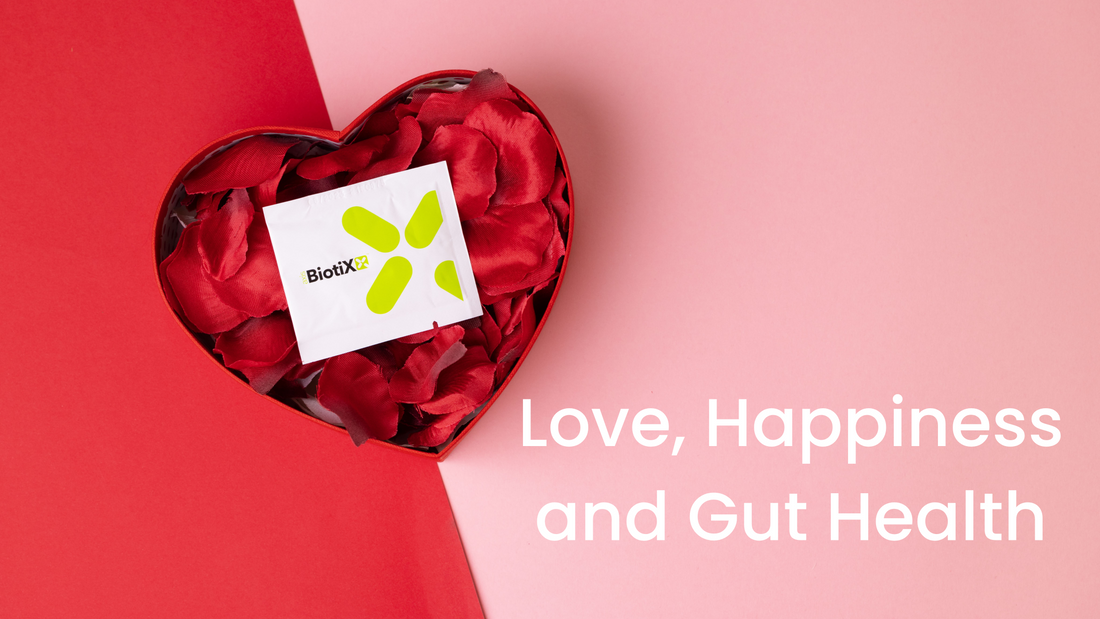Love, Happiness, and Gut Health: The Surprising Connection
Love has long been associated with feelings of joy, fulfilment, and overall well-being. But did you know that being in love and experiencing happiness can also have a positive impact on your gut health? In recent years, researchers have uncovered fascinating connections between our emotional state and the health of our gut microbiome. In this article, we'll explore the correlation between being in love, feeling happy, and maintaining good gut health.
The Gut-Brain Connection:
The gut-brain axis is a complex communication network that connects the gut and the brain through neural, hormonal, and immunological pathways. This bidirectional communication system allows the gut and the brain to influence each other's function and plays a crucial role in regulating emotions, mood, and overall well-being.
Love and Happiness: A Gut-Boosting Cocktail
When we experience feelings of love and happiness, our brains release a cascade of neurotransmitters and hormones, including serotonin, dopamine, and oxytocin. These "feel-good" chemicals not only elevate our mood but also have profound effects on the gut microbiome.
Serotonin, often referred to as the "happy hormone," plays a key role in regulating mood, appetite, and sleep. Interestingly, the majority of serotonin production occurs in the gut, where it influences gut motility and function. Higher levels of serotonin have been associated with a healthier gut microbiome and reduced inflammation.
Dopamine, commonly known as the "reward neurotransmitter," is released in response to pleasurable experiences, including being in love. Dopamine not only enhances feelings of pleasure and satisfaction but also plays a role in gut motility and digestion. Imbalances in dopamine levels have been linked to gastrointestinal disorders such as irritable bowel syndrome (IBS).
Oxytocin, often called the "love hormone" or "bonding hormone," is released during social interactions, physical touch, and intimate moments. Oxytocin promotes feelings of trust, connection, and emotional bonding. Research suggests that oxytocin may also have beneficial effects on gut health by reducing inflammation and improving gut barrier function.
The Gut Microbiome: Love's Secret Admirer?
The gut microbiome, composed of trillions of microorganisms living in the gastrointestinal tract, plays a crucial role in digestion, nutrient absorption, immune function, and mental health. Emerging research suggests that being in love and experiencing happiness may positively influence the diversity and composition of the gut microbiome.
Studies have shown that individuals in happy, loving relationships tend to have a more diverse and balanced gut microbiome compared to those experiencing chronic stress or loneliness. These relationships don't always involve a romantic partner; they could also encompass friendships or family connections that bring you joy. Additionally, the release of "feel-good" hormones like serotonin, dopamine, and oxytocin may create an environment in the gut that supports the growth of beneficial bacteria and reduces inflammation.
Practical Tips for Cultivating Love, Happiness, and Gut Health:
- Prioritise Relationships: Invest time and effort in nurturing meaningful connections with loved ones, friends, and community members.
- Get Moving: Regular exercise has been shown to improve mood, reduce stress, and support gut health by promoting healthy digestion and circulation.
- Eat a Balanced Diet: Fuel your body with nourishing foods rich in fibre, vitamins, and antioxidants to support a thriving gut microbiome.
- Manage Stress: Incorporate stress-reducing activities into your daily routine, such as meditation, deep breathing exercises, or spending time in nature.
Love, happiness, and good gut health are intimately connected, forming a symbiotic relationship that contributes to overall well-being and vitality. By nurturing loving relationships, fostering happiness, and adopting healthy lifestyle habits, we can create an internal environment that supports a thriving gut microbiome and promotes optimal physical and emotional health.

